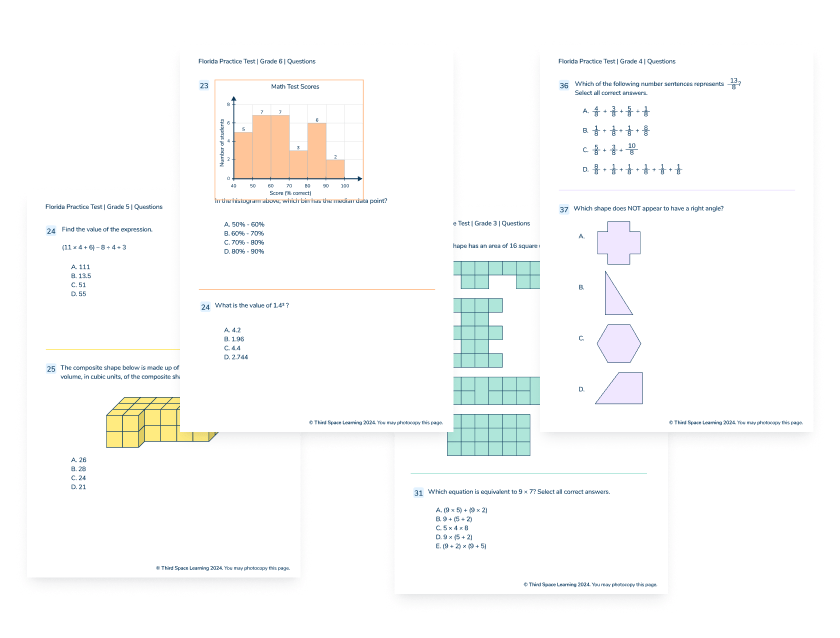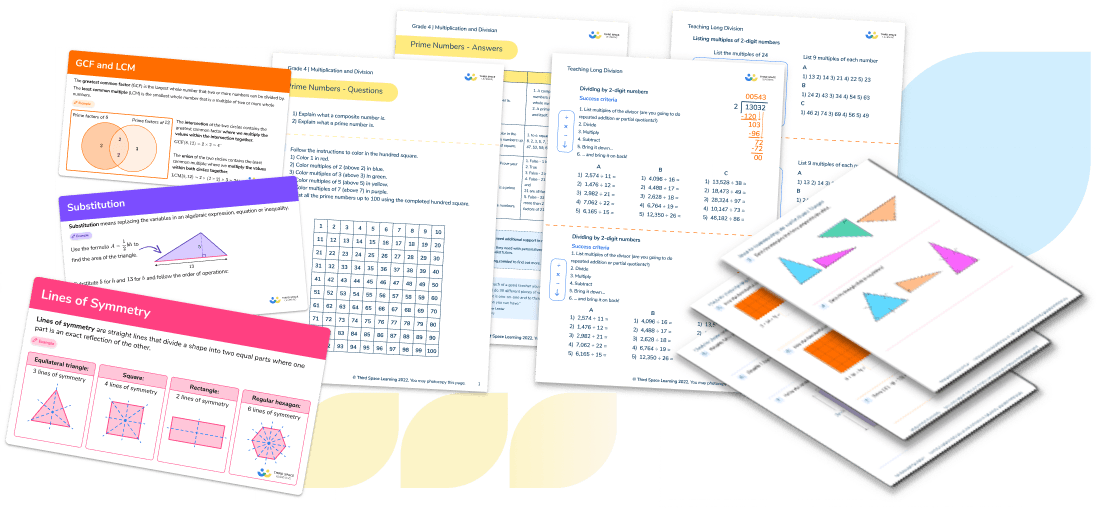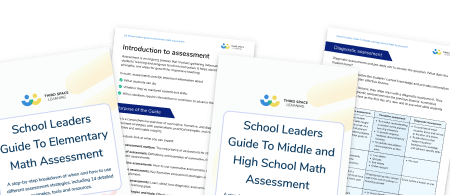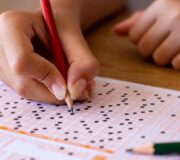What Is Formative Assessment? The Key To Student Success
Formative assessment, otherwise known as assessment for learning, is widely recognised by teachers and schools as a vital tool for teaching and effective learning. Over the past few decades, educationists have conducted extensive research to find out how to maximize formative assessment fo student success. However, the National Council of Teachers of Mathematics found that many teachers and schools find it challenging to implement
This guide to what formative assessment is details everything you need to know about formative assessment for successful implementation and continued success in your classroom.
What is formative assessment?
Formative assessment is a type of assessment that is used to monitor student learning, understanding and progress during the teaching and learning process. Its primary purpose is to provide regular, frequent feedback to both teachers and students, helping to identify areas of strength and weakness, and informing instruction to improve student learning outcomes and close achievement gaps.
It is an integral part of effective teaching and learning, as it allows teachers to adjust their teaching strategies and teaching practices, and make data-driven decisions to meet the diverse needs of their students.
Educators do this by adjusting their teaching strategies, including:
reteaching;
providing scaffolding and support;
addressing misconceptions;
adding stretch and challenge.
Formative assessments empower students to reflect on their own learning, understand and take steps to reach their learning goals. This supports the development of students’ metacognitive strategies and helps them take a more active role in their learning.
School Leaders Guide To Math Assessment
A guide to the different assessment types for elementary, middle and high school, with examples, strategies and free resources to use in your school.
Download Free Now!Assessment research
Over the past few decades, several researchers have investigated formative assessment and its impact on student achievement. This includes the work of Paul Black and Dylan Wiliam who focussed on formative assessments in the classroom in their research, “Inside The Black Box”.
Another notable figure in formative assessment is John Hattie who recognised feedback as a strategy that brings about significant improvements in student performance, especially when feedback was about the student’s own work.
Types of formative assessments
Various types of formative assessment examples can be used in the classroom, including:
Quizzes and tests: These assess students’ understanding of specific concepts or skills.
Class discussions and debates: This informal method assesses students’ knowledge of complex topics and their ability to think critically.
Peer feedback and self-assessment: Help to assess student understanding of their own strengths and weaknesses, as well as their ability to reflect on their own learning.
Technology-enhanced assessments: Online formative assessments assess student understanding of specific concepts or skills, as well as their ability to apply what they have learned in a digital environment.
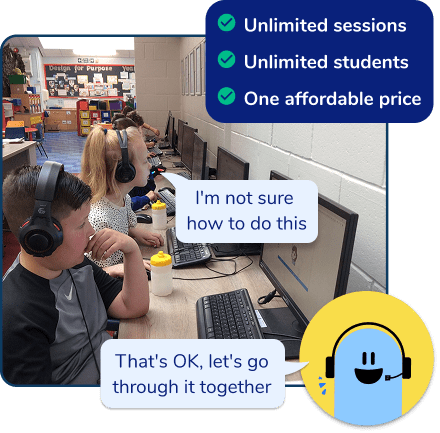
Meet Skye, the voice-based AI tutor making math success possible for every student.
Built by teachers and math experts, Skye uses the same pedagogy, curriculum and lesson structure as our traditional tutoring.
But, with more flexibility and a low cost, schools can scale online math tutoring to support every student who needs it.
Find out moreHow does assessment of learning differ from other forms of assessment?
The purpose of formative assessment is different from assessment of learning, or summative assessment.
Summative assessments are usually administered at the end of a learning period to evaluate students’ learning progress and include end of year tests and exams.
In contrast, formative assessments can occur at any stage of the learning process.
Formative assessment is similar to other forms of assessment, such as assessment for learning and responsive teaching. Some writers use these synonymously while others see a distinction between them.
They all refer to the use of assessment to guide learning, not simply to evaluate it and emphasize the importance of effective types of assessment and feedback processes that help learners reach learning outcomes.
READ MORE: Formative and summative assessment
The formative assessment cycle
Teachers must use a range of formative assessments and progress monitoring strategies at different stages of the learning process to gain greater insights into their students’ understanding.
The formative assessment cycle involves several key steps, including:
Setting clear learning goals and objectives
Gathering evidence of student learning through various formative assessments
Analyzing and interpreting the data collected
Providing actionable feedback to students
Adjusting instruction to meet the diverse needs of students
Repeating the cycle to ensure continuous improvement
What does formative assessment look like in the classroom?
Many teachers understand the importance of effective questioning on student outcomes and it is no doubt an important aspect of formative assessment. However, the most successful classrooms will use questioning among a range of other formative assessment strategies, including:
Direct observation
Feedback
Self-assessment
Peer feedback
The formative use of summative assessments
Classroom examples
Formative assessment or assessment for learning examples include:
Two stars and a wish
Think pair share
Traffic lights
Whichever formative assessment tool you use, it must fit a purpose and use students’ responses to adapt the learning to enhance academic outcomes.
The information obtained from formative assessments can help you understand the children’s learning and adapt to this in future lessons to increase student progress.
HOW THIRD SPACE LEARNING USES FORMATIVE ASSESSMENT
In Third Space Learning’s online one-on-one math tutoring, Skye, Third Space’s voice-based AI tutor built and trained by teachers and math experts, uses formative assessment at the start and throughout the lesson to make sure the support is truly targeted and focused on each learner’s needs.
Students begin each lesson with a diagnostic ‘Skill Check In’ – a question that assesses their understanding of the math topic they’ll be working on with their tutor during their one-on-one session. Skye adapts the lesson in real time based on the student’s answer to ensure they receive the right level of support.

If the student answers the question wrong, Skye uses scaffolding to teach step-by-step; modeling a similar example and working through guided questions first, before moving toward independent practice and challenge later on:
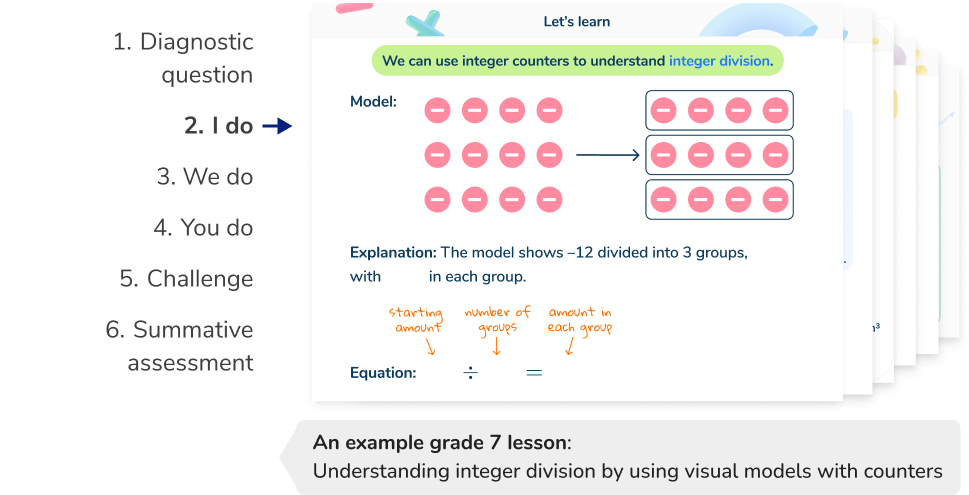
If the student answers the question right, demonstrating readiness, Skye skips straight to application and challenge:
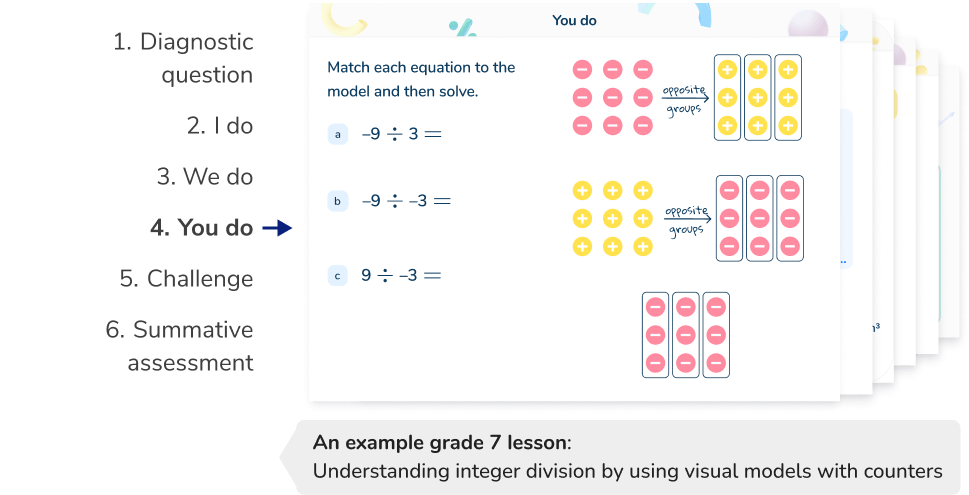
Formative assessment continues through the lesson as Skye identifies misconceptions and adjusts hints in real time to support learning.
Each lesson finishes with a short summative assessment, the ‘Skill Check-Out’, to measure understanding and track progress, followed by a quick confidence check.
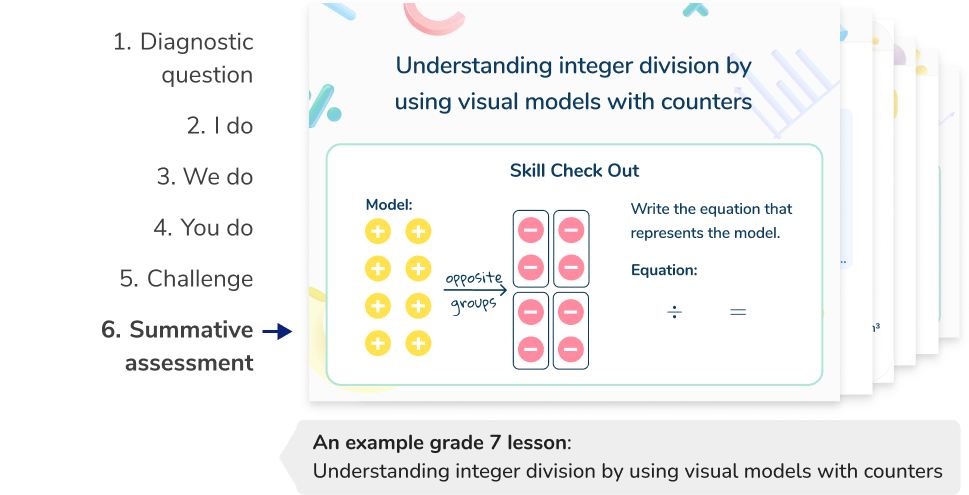
Benefits of formative assessment
1. Greater insight
Teachers can gain insights into the level of understanding across the class at any given point in the lesson. This enables teachers to address misconceptions and errors as they occur.
2. Deeper understanding
Observing how students cope when working alone, in pairs and in groups can provide the teacher with a wealth of information. Teachers are able to not only see the students responding to a task but also listen to their reasoning and discussions to gain a deeper understanding of where each child is and what misconceptions they may still have.
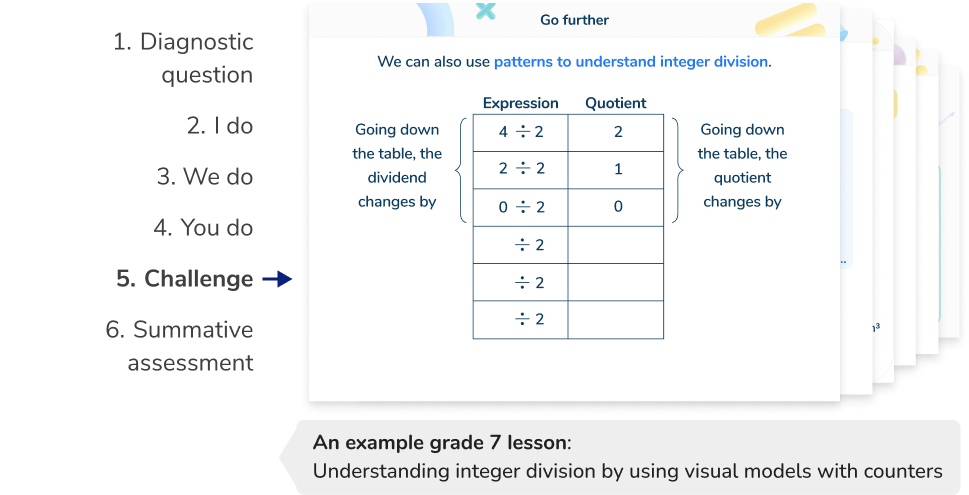
The one-on-one nature of Third Space Learning’s online voice-based AI math tutoring means purposeful talk for math is at the core of our tutoring.
Unlike other AI tools or math apps that rely on chat-based interactions and generating solutions immediately, Skye, Third Space’s AI tutor, functions by talking learners through math problems; speaking, listening, and giving explanations and tailored guidance to help them solve them at their own pace.
Students are able to discuss, explain, and evaluate their thinking, as well as deepen their understanding in a nurturing low stakes environment. It’s one of the things the schools we work with love about our programs.
3. Empower students
Children are involved in their own learning. This greater control helps them to understand what they are aiming for and how they will go about achieving it. This ensures they are better focused on the aims of the lesson.
4. Engaging
Students are more involved in their learning and classroom practice. They have a clearer understanding of what they need to do to achieve success because they receive effective feedback from their teacher. This increases their motivation as they are more aware of their own progress.
Limitations of formative assessment
1. Time-consuming
Formative assessment is usually carried out during lesson time and doesn’t need to add to a teacher’s workload. However, it can become a time-consuming task if a school requires data to be collected frequently. It also takes time to ensure that the information collected is utilized appropriately to have a real impact on student outcomes.
2. Requires training
Teachers need support to ensure they receive the appropriate training to be able to carry out effective formative assessments. Ongoing professional development ensures all school staff have the same shared knowledge of what they are doing and why.
3. Risks becoming a summative assessment
Teachers need to take care to not go down the route of turning assessments for learning into mini assessments of learning.
Use formative assessments regularly in teaching practice taking care not to over use strategies such as mini quizzes.
4. Negative impact on the effectiveness of larger accountability systems
When formative assessments are assimilated into larger accountability systems, such as state standardized testing, it can have a negative impact on the effectiveness of such systems.
Misconceptions of formative assessments
1. It is an event
Formative assessment shouldn’t be classed as a single event, but as an ongoing process which involves educators throughout every lesson.
2. Assessments are discouraging
If the formative assessment is good, it keeps children believing that success is within reach and develops a growth mindset.
3. Assessment for learning doesn’t have a numerical score.
It is not the score or lack of score which makes the assessment formative or summative. It is possible to have a summative assessment with qualitative descriptors and a formative assessment with numerical scores.
4. Multiple choice and selected response tests are always summative.
How this form of assessment is used determines whether it is formative or summative, not the assessment itself.
FAQs
Formative assessment is the use of assessment to improve and guide learning. It’s different from summative assessment, also known as assessment of learning, which evaluates a student’s understanding or learning at the end of a learning period.
The use of mini whiteboards to quiz students on key concepts and ideas during a lesson. Teachers can use this to assess the understanding of their class, identify and address misconceptions and adjust their teaching to support learners.
Do you have students who need extra support in math?
Skye – our AI math tutor built by experienced teachers – provides students with personalized one-on-one, spoken instruction that helps them master concepts, close skill gaps, and gain confidence.
Since 2013, we’ve delivered over 2 million hours of math lessons to more than 170,000 students, guiding them toward higher math achievement.
Discover how our AI math tutoring can boost student success, or see how our math programs can support your school’s goals:
– 3rd grade tutoring
– 4th grade tutoring
– 5th grade tutoring
– 6th grade tutoring
– 7th grade tutoring
– 8th grade tutoring
The content in this article was originally written by former Deputy Headteacher Emma Johnson and has since been revised and adapted for US schools by elementary math teacher Christi Kulesza.
